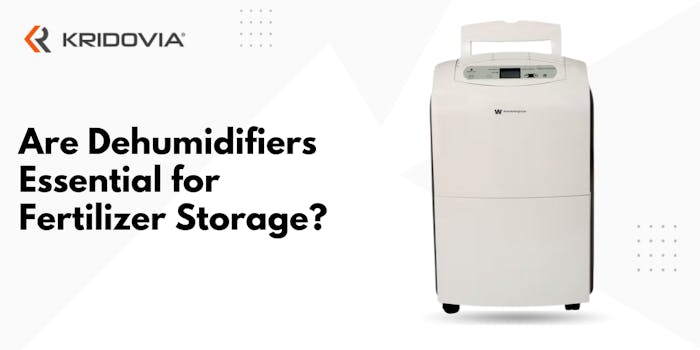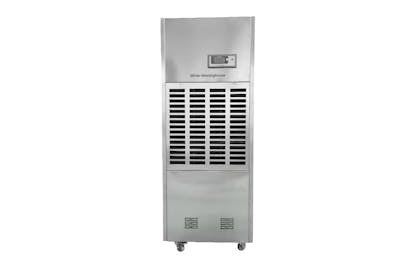Must Read: Why Are Dehumidifiers For Agriculture And Greenhouse Significant?
Why Dehumidifying The Fertilizer Storage Facility Is Essential?
Fertilizer absorbs and releases moisture from the surrounding air, much like a sponge. It aims to achieve a balance in which its own moisture level matches the moisture in the air. This is referred to as "moisture equilibrium".
For example, if the humidity in the storage area is 60%, the fertilizer bags will eventually become 60% wet. Even if the fertilizer is dry at the starting point, moisture from the damp air seeps into it.
The end result is the fertilizer moisture matches the storage room's humidity.
Dry air = drier fertilizer.
Humid air = wet fertilizer.
This is why humidity control is so important when storing fertilizer properly. Simply closing it or having dry initial bags is not sufficient. The surrounding moisture will continue to be absorbed over time. If the air is too damp, it becomes nearly impossible to keep the fertilizer dry and flowing.
So managing the humidity in the storage area with devices like a white Westinghouse dehumidifier helps keep your fertilizers in good condition.
What Is The Ideal Humidity Level For Storing Fertilizers?
The ideal humidity level for storing fertilizers is below 60% relative humidity. Most experts suggest 50% relative humidity or lower if possible. This reduces moisture absorption and quality deterioration.
However, all-purpose granular mixes containing nitrogen, phosphorus, and potassium, the relative humidity should be kept about 30-40%.
Aim for a relative humidity of 25% or below for 100% nitrogen products such as urea. These are very moisture-sensitive and require the driest storage conditions.
Learn More : Why Do You Need Refrigerant Dehumidifier For Cold Storage?
What Are The Benefits Of Using Dehumidifiers For Fertilizer Storage?
Using dehumidifiers for fertilizer storage offers several key benefits:
Dehumidifiers keep humidity low and prevent fertilizer from collecting excess moisture, resulting in hard, compacted caking. This keeps the fertilizer free-flowing.
Excess moisture causes chemical changes, reducing macronutrients such as nitrogen. Dehumidification helps to stabilize nitrogen levels and maintain nutritional integrity.
Dehumidifiers create a dry environment in the storage area, limiting microbial growth and preserving nutrition levels.
Certain fertilizers can react with moisture, reducing their effectiveness or forming harmful compounds. Dehumidifiers prevent these reactions, ensuring the fertilizer retains its intended chemical properties.
The most significant benefit is that dehumidifiers reduce moisture exposure, allowing fertilizer to remain effective for longer periods.
Why White Westinghouse Dehumidifier Is The Best Choice For Fertilizer Storage In India?
With hot and humid conditions widespread throughout India, moisture control becomes essential for efficient storage of fertilizers. The White Westinghouse 168-liter dehumidifier is a good alternative for Indian weather and storage requirements.
This model has a dehumidification capacity of 168 liters per day which ensures efficiently absorbing moisture from the air, and maintaining an ideal climate for fertiliser storage, even in big areas.
It covers 20000 cubic feet of storage space and effectively regulates humidity levels, providing uniform protection against moisture-related issues.
Hence, this device is an excellent choice for all farmers, manufacturers, and fertilizer dealers in India who are looking for a highly durable, yet reasonably priced, dehumidifier for storage preservation.








